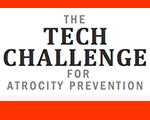Open Innovation to Help Prevent Mass Atrocities
Published Apr-22-13Breakthrough:
Following the announcement of President Obama’s strategy for preventing mass atrocities, an ambitious open innovation project was launched for technological ideas that could help.
Company:
USAID and Humanity United, United States
The Story:
 The Tech Challenge for Atrocity Prevention is a global open innovation initiative that is seeking novel technology-based solutions to deal with the worst kinds of human rights violations, such as rape, genocide and ethnic cleansing.
The Tech Challenge for Atrocity Prevention is a global open innovation initiative that is seeking novel technology-based solutions to deal with the worst kinds of human rights violations, such as rape, genocide and ethnic cleansing. The contest is sponsored by The US Agency for International Development (USAID) and Humanity United. It seeks to harness individual and collective creativity to help put a stop to some of the horrors that blight humanity.
President Obama’s Speech
The Tech Challenge for Atrocity Prevention supports President Barack Obama’s strategy for preventing mass atrocities and genocide. In a speech on April 23, 2012 he said: “Our security is affected when masses of civilians are slaughtered. Refugees flow across borders and murderers wreak havoc on regional stability and livelihoods."
“Preventing genocide is an achievable goal. It starts from the bottom up. You don’t just count on governments. You count on people and mobilizing their consciences.”
Contest Categories
There are five challenge categories in all– Enablers, Capture, Model, Communicate, and Alert. In February 2014 the first phase of the contest was completed when winners of the first two challenges were announced.
Participants from 22 countries submitted 88 ideas that were assessed by a panel of judges including representatives from the US Holocaust Memorial Museum, the International Crisis Group, and the United States National Security Council.
Seven innovations were awarded first, second and third places and the prizes ranged from $1,000 to $5,000.
“What's exciting about the Tech Challenge is the opportunity for individuals and groups around the world to provide innovative solutions to some of the world's most intractable problems,” said Randy Newcomb, CEO of Humanity United.
“The chance to leverage the skills and experience of such a global audience is truly extraordinary.”
Prize-Winning Ideas
The Capture category sought ideas to improve the collection of evidence to allow authorities to prosecute perpetrators more effectively. The first prize was awarded to Physicians for Human Rights, a non-profit organisation based in Cambridge, Massachusetts.
Their idea was for a mobile phone app called ‘MediCapt’ that allows physicians working in trouble spots to better document medical evidence of atrocities and securely transmit the data.
The second prize in this category was for an idea called ‘Silent Lens’. It's a mobile app that allows users to covertly take pictures and simultaneously record their location and time. This would be particularly useful during Internet blackout situations in a hostile environment. The app would operate via an encrypted peer-to-peer Bluetooth network.
The Enablers category sought concepts that could identify third-party enablers of atrocities. These are non-state actors who provide support, intentional or otherwise to those committing or planning to commit atrocities.
The first prize was awarded to Le-Marie Thompson, founder of a product development company from Bowie, Maryland. Her idea is for a software program to ensure product designers are using ‘conflict free’ electronic components in their products.
This addresses the issue of companies unintentionally using components made from conflict materials. The second prize was for a platform to promote socially conscious tourism.
Ideas that can Change Lives
The contest attracted participants from all over the world who brought new perspectives to the problems and delivered brand new solutions.
Next Story »

